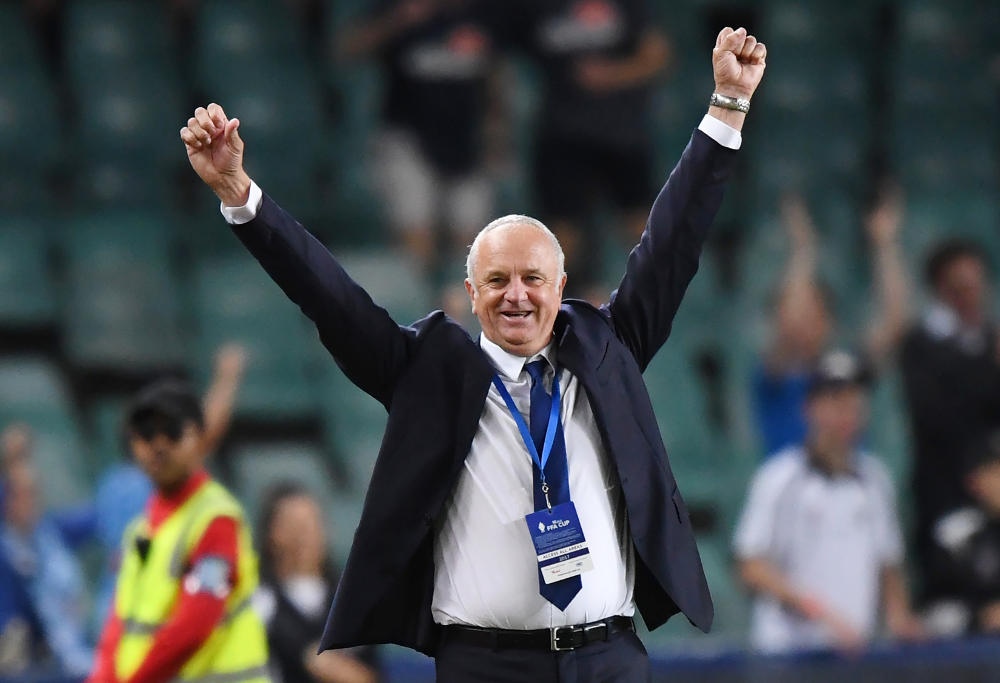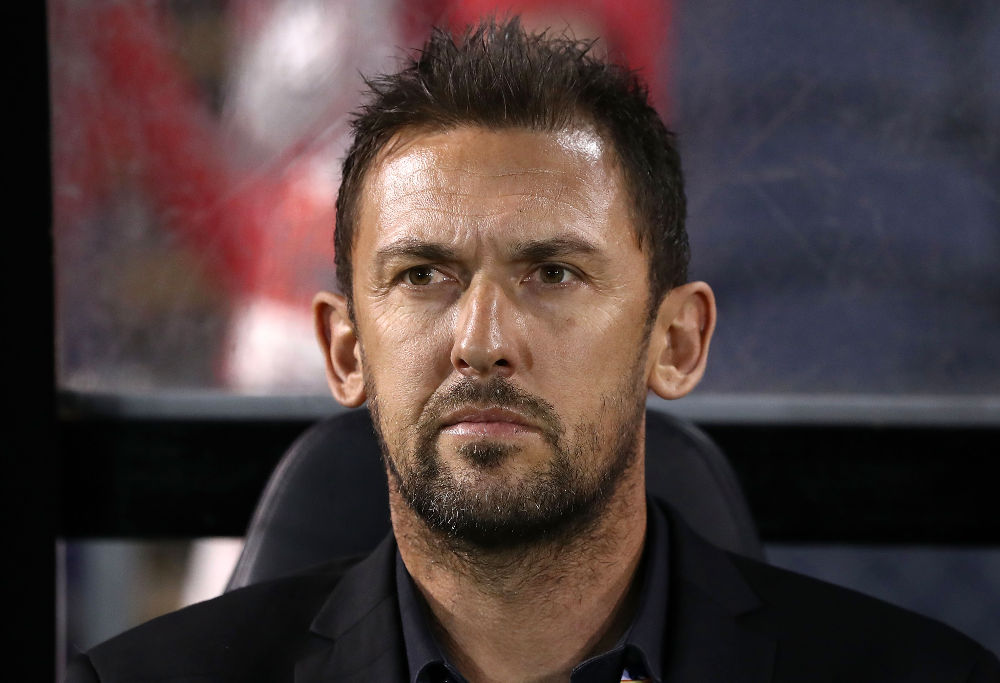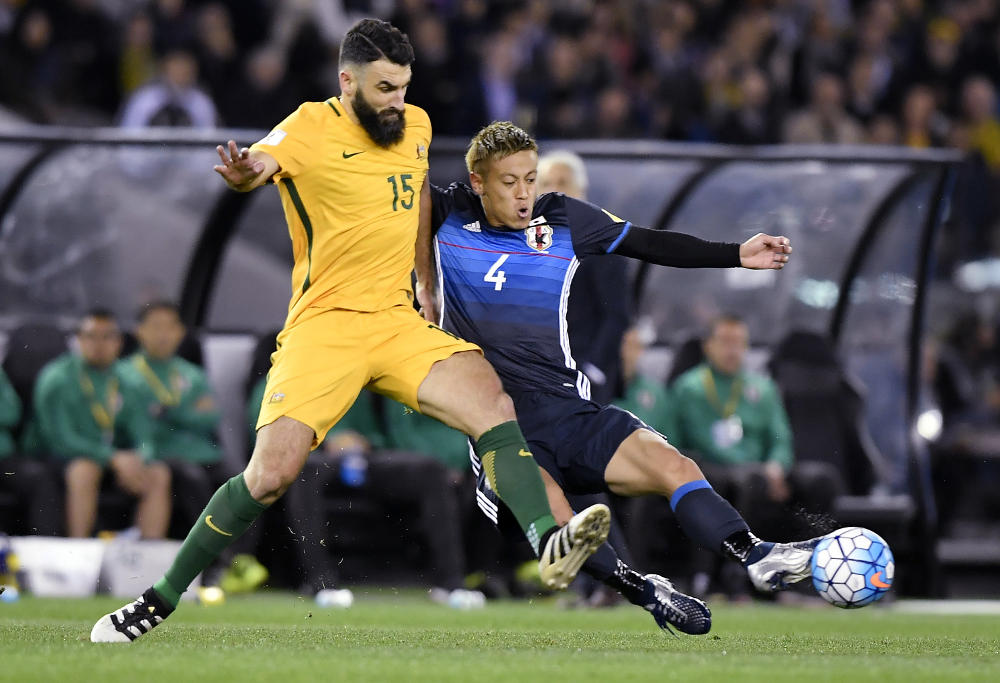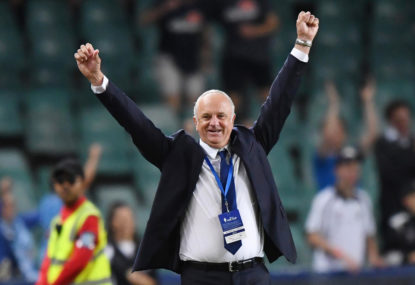Ange Postecoglou’s Socceroos legacy theoretically meant the identity of his successor would have been obvious: a coach willing and able to continue with the proactive style of play implemented, with the courage and foresight to evolve the system and personnel.
In identifying Postecoglou’s replacement, however, the problem lies in his timing. The immediately obvious internal candidates, Ante Milicic and Josep Gombau, both moved into new roles in the weeks leading up to Postecoglou’s departure.
Meanwhile, there are several external candidates (reportedly over 200) so while a decision will not be made by the FFA’s selection panel until February, it is worth considering how some of the leading candidates fit the role from a tactical perspective.
Graham Arnold
The current Sydney FC coach, Graham Arnold is the favourite and has reportedly already been offered the role. Arnold is a divisive coach – while undeniably successful, the major concern is his supposed defensive approach.
However, this is something of a misconception. Being good defensively does not automatically make you defensive, and where Sydney excel is in making it very difficult for opponents to play through them. They set up in a compact, organised 4-4-2 block, with the front two making it difficult for opponents to progress forward effectively.
Opponents will often build up slowly inside their own half, moving the ball passively in front of the defensive block. Sydney are happy for this to happen, and where they are particularly effective is when the opposition does play forward, as the midfield and front-third players are excellent at pressing their direct opponent to force backwards passes, then stepping up collectively to maintain pressure on the ball inside the opposition half.
In fact, Sydney scores a high percentage of goals from regains inside the opposition half. Although the structures and principles are different, the basic concept of effective pressing is a characteristic of both Arnold and Postecoglou.

(AAP Image/David Moir)
Where they differ in their approach is with the ball. Arnold’s Sydney build up more slowly from deep positions, allowing their central midfielders to get into positions ahead of the ball where they can receive the ball in time and space, but also be in a position to break up any potential counter-attacks.
The riskiest passes are into the likes of Ninkovic and Adrian Mierzejewski, because these playmakers are able to retain the ball under pressure from behind, but also because the central midfielders are positioned behind the ball when these passes are made, again where they can stop any quick breaks from a turnover of possession.
Postecoglou wants his players to position more aggressively between the lines, where they can turn and face forward on their first or second touch. Being in a position to attack is the first priority, whereas Arnold puts slightly more emphasis on preventing the opposition from attacking, which changes the tempo of the attacks, and the positioning of the midfield players.
Tony Popovic
Another local candidate in consideration is Tony Popovic, recently sacked by Karabukspor. What is interesting about Popovic is that he has demonstrated a willingness to change the style of play as a coach.
His first ‘identity’ was as a pressing coach. The ‘original’ Wanderers were fantastic at closing down teams high up the pitch, moving towards goal quickly through the pace of Mark Bridge and Youssouf Hersi. Again, like Arnold, this tactical feature is consistent with what Postecoglou introduced to the national team.
The ‘new’ Wanderers were more patient and possession-based. In fact, a major criticism of Popovic’s latter era was that the side was too predictable, as they retained the ball for long periods without genuinely penetrating the opposition.
Where the Wanderers were exciting to watch, however, was when they pieced together quick, incisive, vertical passing moves to break through opposition teams. The speed of these combinations provided a neat complement to the sideways passing.
The key consideration, though, is the fact that Popovic has demonstrated he can change his approach. If Postecoglou was genuine about establishing a long-term identity for the national team, it is feasible Popovic could continue the journey down that path in his own unique way.

(Photo by Ryan Pierse/Getty Images)
Marcelo Bielsa
A real legacy, however, would be Marcelo Bielsa. Infamous in football for his manic commitment to advancing tactical theory, there is a method to Marcelo’s madness. He advocates an intense, high-pressing approach combined with extreme flexibility in terms of formations, and demands constant attacking.
If Postecoglou was divisive, Bielsa would be a whole new extreme.
Evidenced by his previous work at international level, Bielsa would be a short-term tenure with long-term ramifications. For example, Bielsa laid the foundations for Chile’s recent success (non-qualification for next year’s World Cup aside), implementing a clear national playing style as well as best practice in opposition and video analysis.
Bielsa analyses the game to scarcely believable depths. Some of his oft-quoted theories include ‘36 ways to communicate through a pass’ and ‘26 ways to play football’. He challenges deep-seated notions, fundamentally believes in his own methods and process and takes players to their extremes, both tactically and physically.
He would be the most logical tactical fit to follow Postecoglou, but also the greatest leap of faith.
Ralf Rangnick
A less daring, but perhaps more logical candidate, might be Germany’s Ralf Rangnick. Currently the sporting director of Red Bull Leipzig, Rangnick has enjoyed success in the Bundesliga with both Hoffenheim and Schalke, and has previously been linked with international roles at both England and Belgium.
Part of his appeal is his clear philosophy, which has been implemented at not only Leipzig but Red Bull’s other clubs, including Salzburg and New York.
In one sentence, it is about pressing and attacking at speed. Again, there are parallels with the other names in the frame. Rangnick’s approach would primarily be about continuing the high-tempo aspects of Postecoglou’s legacy – in particular, the aggressive defence.

(AP Photo/Andy Brownbill, FILE)
Appointing Rangnick would also likely see a shift back towards the early days of the Postecoglou era, when they tried to break through opponents swiftly in order to create opportunities to get the ball into the penalty box in quick time.
The fundamental consideration of all potential candidates, however, is whether they will continue in a similar vein to the previous era tactically. Postecoglou’s mantra – never take a backwards step – was constantly instilled in the players as their way of playing.
To appoint someone who is ideologically opposed to this is, to put it simply, a backwards step. If the FFA move in this direction, it perhaps illuminates the reasons behind Postecoglou’s surprise departure.
If, though, the governing body is genuine about continuing the Postecoglou legacy, then any one of these four candidates can, in some way, learn from it, build on it and most importantly, evolve it.
































































































